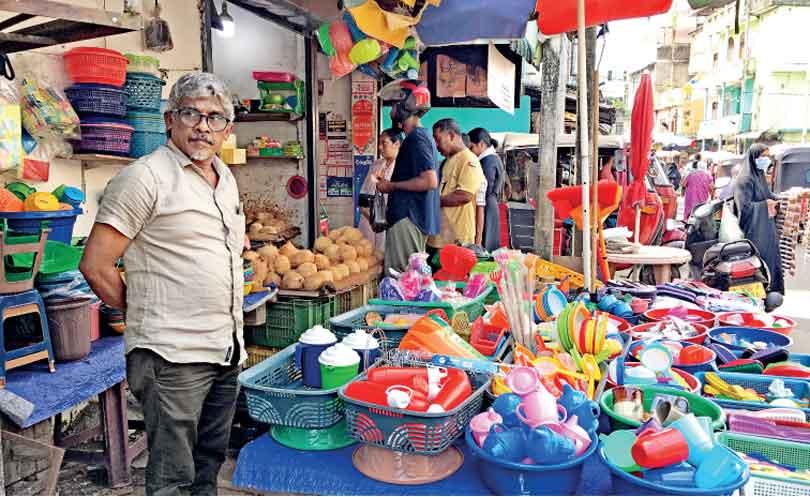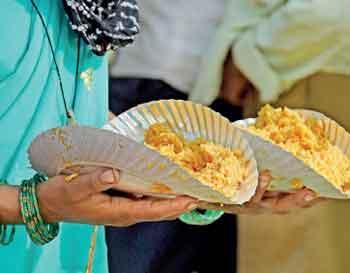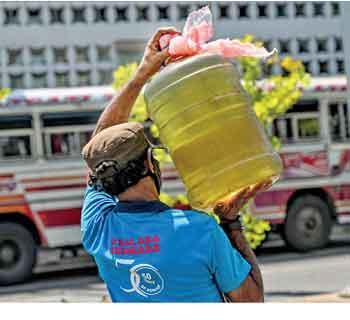14 Nov 2023 - {{hitsCtrl.values.hits}}

People are feeling the heat when purchasing essentials after the government imposed multiple taxes on consumers to meet the conditions laid out by the International Monetary Fund (IMF)
“The IMF has specifically said that they aren’t happy about how we are preparing the Budget. This is why we need realistic values. We have agreed to the IMF to maintain a low budget deficit and in this backdrop it would be difficult to increase government revenue,”
- Prof. Aminda Methsila Perera, Head Department of Accountancy, University of Wayamba
“There are no savings at the end of the day; once I pay the rent for the shop, settle utility bills and buy essential items to the house. A plastic strainer that was previously sold at Rs. 20 is now sold at Rs. 100. An item that was priced at Rs. 100 a few years ago is now priced at Rs. 1000 given the circumstances”
- Mohideen Ifthikar, Kitchenware Vendor from Maligawatta
“The government should be creating opportunities for income generation. Who will be willing to invest in a situation like this”
- Dr. Indrajith Aponsu, Senior Lecturer in economics, University of Colombo
“But what can I do with Rs. 50,000 when I have to pay for my children’s school and tuition fees, settle electricity bills, purchase medicines for my mother and spend the rest of the money on essential goods,
-Renuka Sandamali Resident of Maligawatta
 Mohideen Ifthikar from Maligawatta makes a living as a kitchenware vendor. His daily income ranges between Rs. 1500-2000. Having left his previous job as a site supervisor, Ifthikar worries about not being able to save enough money for his future.
Mohideen Ifthikar from Maligawatta makes a living as a kitchenware vendor. His daily income ranges between Rs. 1500-2000. Having left his previous job as a site supervisor, Ifthikar worries about not being able to save enough money for his future.
This is a common story shared by a majority of Sri Lankans who are facing hardships to survive the prevailing economic crisis. The government imposed multiple taxes on people to meet the conditions laid out by the International Monetary Fund (IMF). Many factions claim that the ‘Social Protection and Welfare’ Budget has been designed to please the IMF and that the government should be presenting more realistic figures and estimates.
 |
| The majority of people have one request and that is to bring down the taxes and reduce the cost of living |
 |
| Most daily wage earners don’t have any money to save once they meet all their expenses
|
A future sans savings
For Ifthikar, earning Rs. 2000 a day doesn’t suffice as his expenses exceed his income. “There are no savings at the end of the day; once I pay the rent for the shop, settle utility bills and buy essential items to the house. A plastic strainer that was previously sold at Rs. 20 is now sold at Rs. 100. An item that was priced at Rs. 100 a few years ago is now priced at Rs. 1000 given the circumstances,” he said in an interview with the Daily Mirror.
He therefore questioned how he could possibly save any money when expenses are skyrocketing by the day. “This is a beautiful country, but people are divided. They don’t want to help one another. It’s the politicians who have done the damage. Hence it’s the people who will suffer,” said Ifthikar.
People have therefore compromised on bearing additional expenses while many apply for loans to survive the day. Renuka Sandamali, another resident of Maligawatta shares a similar story. She is a tailor by profession and her monthly income is around Rs. 50,000. “But what can I do with Rs. 50,000 when I have to pay for my children’s school and tuition fees, settle electricity bills, purchase medicines for my mother and spend the rest of the money on essential goods,” she questioned. “I don’t have any money to save once I meet all my expenses. This is not what we expected a few years ago. Previous governments had never thought about the people. It will be the same this time around as well. We don’t want any relief schemes like Samurdhi. Our only request is to bring down the taxes and reduce the cost of living. The government is very much capable of doing it, but they have to fill their pockets first. So our priorities don’t count,” she complained.
Politicisation of welfare benefits
As per the Budget 2024, the Aswesuma social protection allocation has been increased by Rs. 183 billion while the allocation for senior citizens has been increased to Rs. 3000. But economic experts believe that providing welfare schemes to the people would only help sustain the existing political system. “We need growth and development both, but these welfare benefits don’t contribute to the growth momentum,” said Dr. Indrajith Aponsu, Senior Lecturer in economics at the University of Colombo. “The government should be creating opportunities for income generation. Who will be willing to invest in a situation like this? The government needs to facilitate grounds for entrepreneurship, but bureaucracy has been such a barrier and it has intensified,” said Aponsu.
Need for realistic values
Last month, public servants took to the streets demanding an increment of Rs. 20,000 to which President Ranil Wickremesinghe responded in the affirmative. During yesterday’s (November 13) Budget President Wickremesinghe promised that the cost-of-living allowance for public servants will be increased to Rs. 17,800 from Rs. 7800 with effect from January 1, 2024 while the payment will commence from April 1, 2024.
“Increasing government workers’ salaries will add another Rs. 240 billion to the budget expenditure,” said Prof. Aminda Methsila Perera, Head – Department of Accountancy, University of Wayamba. “The government has to increase the social welfare network such as Samurdhi, but this time they have to go for more realistic values. The Budget is a policy document. Those days we used to listen to the Budget and analyse the developmental activities. But today it’s just numbers,” said Prof. Perera
Prof. Perera said that the government revenue is Rs. 4150 billion, but that it would be a challenge to collect this amount. “The IMF has specifically said that they aren’t happy about how we are preparing the Budget. This is why we need realistic values. We have agreed to the IMF to maintain a low budget deficit and in this backdrop it would be difficult to increase government revenue. It’s an issue to go for new taxes because already most businesses have closed down,” said Prof. Perera.
While Sri Lanka has been trying to please the IMF it has also incurred many losses. “Over the past 10 months our exports have dropped by US$ 900 million. We did all these changes to obtain US$ 330 million as the first instalment from IMF. We are still awaiting the second instalment,” he said while adding that there could be certain positive aspects such as providing subsidiaries for SMEs; all which would happen amidst tight controls on the economy.
Hence, for the Ifthikars and Renukas, survival hangs in the balance as they continue to live with hope for a better future - a future without taxes and a future where they could save at least a little bit of their earnings.
25 Dec 2024 2 hours ago
25 Dec 2024 2 hours ago
25 Dec 2024 3 hours ago
25 Dec 2024 4 hours ago
25 Dec 2024 5 hours ago